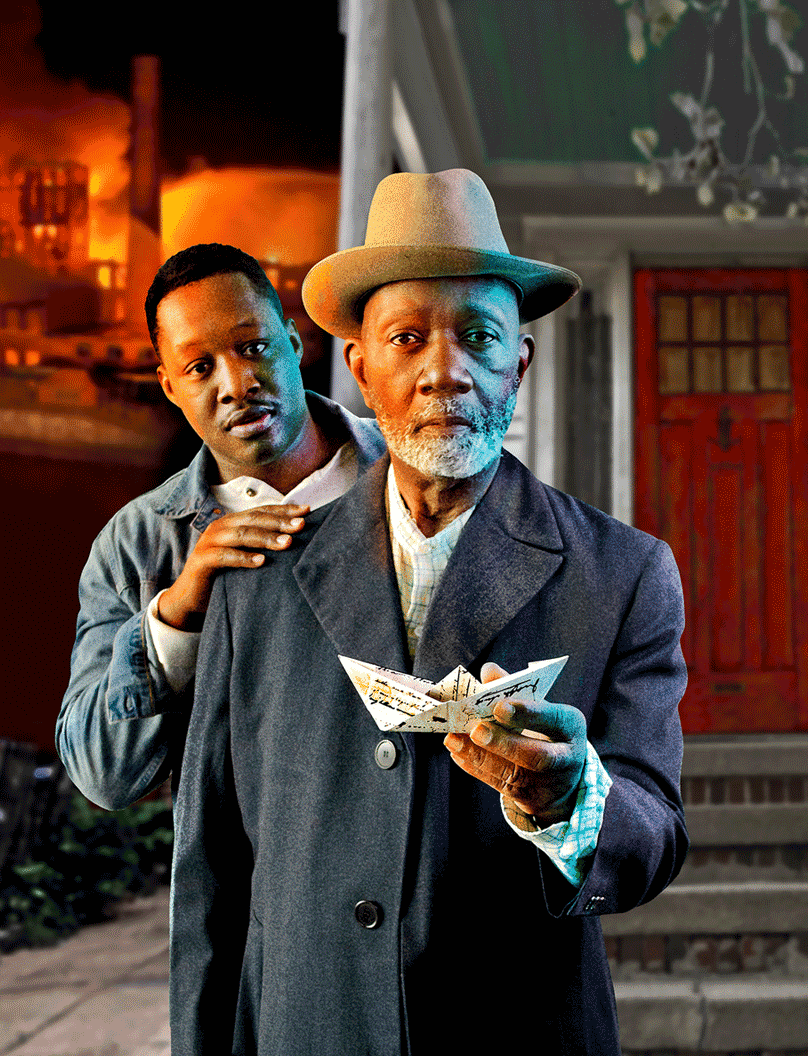In 1987, when August Wilson’s Fences received the Pulitzer Prize for Drama, the Providence Journal’s arts critic William Gale hailed the Pittsburgh playwright: “His plays leap from his own gut. They’re about things that really count — family relationships, the Black experience in America — and they have many colors, a multitude of themes, great seriousness along with humor and gusto. They strike where you live.”
Later that year, Trinity Repertory Company brought Wilson’s work to Providence. From its 1987 production of Ma Rainey’s Black Bottom set in a studio with the eponymous blues legend to Radio Golf in 2020 charting an aspiring politician’s attempt to reconcile community interests with urban development, Trinity Rep has cycled through the struggles Wilson wrote of in the 20th century. (The Providence Black Repertory Company, a now-defunct nonprofit that spun out from acting workshops at AS220, staged Fences in 2001, as did the Mixed Magic Theatre in Pawtucket in 2013.) With Gem of the Ocean opening at Trinity Rep on Feb 24, Motif’s Sean Carlson interviewed the director of community engagement Michelle Cruz about how Wilson’s words continue to strike.
Sean Carlson (Motif): This year marks the 40th anniversary of the first production of Jitney – and 35 years since the first Trinity Rep production of Wilson’s work. Why do his plays continue to resonate?
Michelle Cruz: In many ways, we harken back to whether Black Americans would have been better to stay in the South. Time and time again, we’re faced with this question in his characters — some of whom we see grow older and whose future generations of family we meet – and wonder, are they truly faring better? Was the Great Migration that great? What have generations of residents gone through with redlining and unfair housing practices? What has that lack of opportunity done to the possibility of generational wealth? Whether here in Providence or Wilson’s Pittsburgh, parallels unfortunately remain.
SC: The last show Trinity Rep staged before COVID-19 was Radio Golf. With Gem of the Ocean now opening, it’s like Wilson bookends a period that has pulled on these threads of family and community.
MC: More eyes have opened to the disparities Wilson explores, absolutely in minority families but also those who have, all of a sudden, found themselves in a place of hopelessness and restlessness.

SC: For more than a year, you’ve led an August Wilson reading group. How did the program start?
MC: “10 Weeks with August Wilson” began with a personal goal. Months into the pandemic, I decided to escape into the Century Cycle of Wilson’s plays. At Trinity Rep, we were trying to connect with our audiences virtually. I mentioned my goal, and our education director thought we could get folks to delve into Wilson. Our class sold out in a day. Attendees love being placed in these decades. We have people from Sri Lanka, New Zealand, and of course locals of all ages, from a board member to a father and daughter who bonded by reading Wilson in what has otherwise been an isolating time. [Ed. note: Trinity Rep’s next class on Wilson’s work begins Feb. 26, with registration currently open.]
SC: The Netflix release of Ma Rainey’s Black Bottom as a feature film last year includes an astounding performance by Viola Davis as the eponymous blues singer. Davis grew up in Central Falls and graduated from Rhode Island College. She debuted on Broadway in a 1996 run of Wilson’s Seven Guitars. How have you seen Davis’s talent and trajectory inspire others locally?
MC: She’s an absolute inspiration to many, whether interested in acting or not. Representation matters: The sheer presence of someone who looks like you can plant that seed to strive for more. I remember the Adams Central Library in Central Falls showing the film Fences and walking toward a nearby street, Viola Davis Way, and feeling a huge sense of pride. Ma Rainey is such a needed story to tell, for what was going on with race in the recording industry, the theft of Black music, and her struggles as a woman in the business. Actors are storytellers and Davis’ story is powerful – for students, other actors and our community.
SC: What’s on your mind as you prepare for Gem of the Ocean to open at Trinity Rep?
MC: Gem of the Ocean is a lyrical masterpiece of myth and history. W.E.B. DuBois spoke to the notion of developing Black theater that was “by us, for us, near us and about us.” Years later, in his speech, “The Ground on Which I Stand,” Wilson reminds us of the connections of Black theater to its origins on the slave plantations of the South, either as forced entertainment for slaveowners and guests or as an investment in a tradition of the arts for spiritual survival, in the spirit of their ancestors.
SC: For readers unfamiliar with Wilson, where should they begin?
MC: With the man himself. Read Wilson’s autobiographical How I Learned What I Learned. He shares inspirations for his characters and tells us about his life, including quitting school after a plagiarism accusation because a paper he wrote was “too good” and spending his days at the Carnegie Library instead. Walk in his footsteps. Sit with him listening to neighbors at local diners. Then, delve into his Century Cycle masterpieces chronologically, decade by decade. It’s a journey and time well spent.